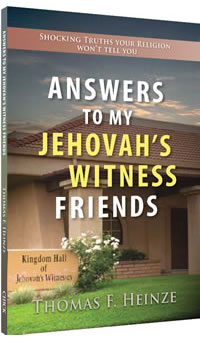Heavenly Hope No Longer Offered to Jehovah’s Witnesses
By Daniel Rodriguez
The 144,000—one of the foundational teachings of the Watchtower Society—represented those who were sealed to go to heaven: the early Jehovah’s Witnesses. According to Watchtower doctrine, this number was fulfilled in 1935. These individuals were considered to have a heavenly hope and held the authority to lead the organization’s followers.
Those who joined the organization after 1935 were labeled “The Great Crowd”—Jehovah’s Witnesses with an earthly hope. These are the ones you might see in public places or knocking at your door.
In other words, the Watchtower teaches a two-class system: those with a heavenly hope and those with an earthly hope. Today, the vast majority of Jehovah’s Witnesses do not want to go to heaven. Their hope is to remain on a future Paradise Earth.
For decades, the Watchtower taught that Jehovah God used the 144,000 as His leaders on earth to direct the organization. Yet under their leadership, many teachings and “prophecies” either changed or failed to come to pass. The April 1, 1972 edition of The Watchtower (p. 197) even invites the reader to examine the record of these prophetic statements by asking, “What does it show?”
Now, most of the original 144,000 have either died or no longer place their trust in the organization. The once “all-powerful” concept of the 144,000 has diminished—due simply to attrition. Their authority has now shifted to the Governing Body of Jehovah’s Witnesses, currently composed of eleven men.
Matthew 24:45 was the foundational Scripture which gave the 144,000 the authority it needed to lead the organization as a whole. Since the group was declared “sealed” in 1935—now 90 years ago—the Watchtower ran out of time and was forced to adapt. They shifted power from the 144,000 to the Governing Body in order to preserve the teaching.
Originally, the title of “Faithful and Wise Servant” was given to founder Charles T. Russell. After his death, the title was transferred to the 144,000. Now, that role has been assigned to the Governing Body—a select group of eleven men. This change has allowed the organization to claim continued authority to lead, teach, and discipline its followers. According to Watchtower doctrine, there must always be an organization on earth to represent Jehovah God.
The Governing Body is now synonymous with “the organization,” or “Jehovah’s organization.” Interestingly, the Governing Body openly admits that they are not inspired by God. Still, Jehovah’s Witnesses cling to them as Jehovah’s appointed channel—equating the organization’s direction with Jehovah Himself. The design of the organization intentionally fuses loyalty to “God” with loyalty to the Governing Body. To question the organization is seen as questioning Jehovah.
This structure presents a serious barrier to the Gospel. For a Jehovah’s Witness, challenging the Watchtower is tantamount to rebelling against Jehovah God.
So where does that leave those of us who want to reach Jehovah’s Witnesses with the gospel? By using the above information, you can help a Witness acknowledge that the 144,000 no longer hold any real authority. You can show them that authority now belongs solely to the Governing Body—a group of men who claim to represent a God they have neither heard from nor been inspired by.
You can help a Jehovah’s Witness see that they are being led by men whose uninspired interpretations result in a belief system built on human imagination rather than divine revelation. Once the curtain is pulled back, a Witness can then become much more open to hearing about the true gospel.
- See more articles on related topics:
- Jehovahs Witness
- Witness to JWs
- JW Teaching
Other Articles from September/October 2025:
More on Jehovahs Witness:
Products of Interest:
-

Answers To My Jehovah's Witness Friends
128 pages
Don’t turn JW’s away from your door. Learn how to reach them. This book exposes the errors of this religion and provides questions JW’s can’t answer. Covers the name "Jehovah," giving and receiving blood, eternal punishment and more. 
War Games!
This compassionate tract shows Jehovah’s Witnesses why Jesus is God. It’s in their own Bible.-

Watchtower's Coming Crisis, The
64 pages
Who will guide the Watchtower when the original witnesses all die? This is a crisis that will shake the faith of millions of JWs. Here are the facts. -

Winning The Witnesses
107 pages
Help JWs see the Watchtower is NOT inspired, but the Bible IS! So which should they trust? Construction of a Kingdom Hall was stopped with this approach.



